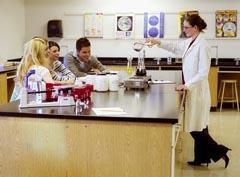Research reveals little evidence of lasting effects of practical tasks on students' understanding of concepts
Ian Abrahams of Bishop Grosseteste University College and Robin Millar of the University of York have investigated the effectiveness of practical work as a teaching and learning strategy.1
They observed 25 science lessons taught in eight secondary schools in England and interviewed the teachers and students afterwards. In all the lessons the teachers focused on the substantive science content of the practical task and ignored any points to do with scientific enquiry such as collection and interpretation of data.
The researchers evaluated the effectiveness of activities in two areas. The first focused on observables such as objects, materials and phenomena; and the second looked at ideas and understanding. The assessment was further broken down into immediate effectiveness concerned with learning in the lesson, and longer-term effectiveness concerned with the students' ability to recall events and show understanding of the ideas at a later date.

The practical work observed was, in most cases, effective because it was based on 'recipe style' tasks that the students could follow. The teachers were more comfortable in using activities that were part of a prepared scheme, particularly if they were teaching outside their subject specialism.
During the lessons the teachers gave a low priority to the understanding of the underlying ideas behind the activity and they were generally ineffective in helping students to see the task from a scientific perspective. In post-lesson interviews many students could recollect details of what they had done or observed during the lesson. Often, however, this was all they could recall.
According to the researchers, there was little evidence of lasting effects of practical tasks on students' understanding of concepts. The problem was that while the teachers expected the activities to support concept learning they didn't plan how to link the activity to the development of ideas.
References
1. I. Abrahams and R. Millar, Int. J. Sci. Educ., 2008, 30 (14), 1945-1969.









No comments yet